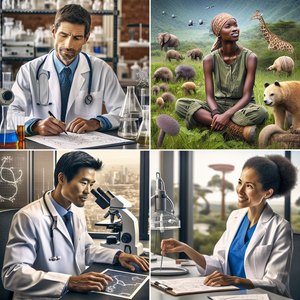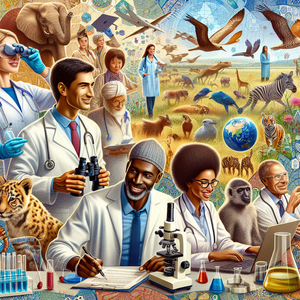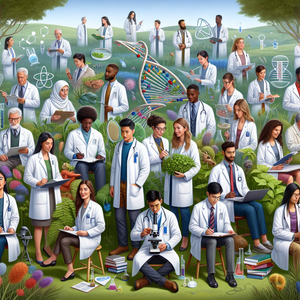
Exploring Rewarding Career Paths for Biology Majors
Biology majors often face a multitude of career choices upon graduation. While many are familiar with traditional paths like medicine and research, there are also unique options such as cosmetic chemistry and snake milking. Even jobs like plant breeding, though not commonly associated with glamour, provide a serene work environment and competitive salaries, showcasing the diverse opportunities available to biology graduates. This article highlights the various career options for biology majors, particularly those that blend biology with data science and technology. From environmental conservation to biotechnology, biology graduates can thrive in numerous fields. Here, we provide an overview of both familiar and unexpected career paths, offering guidance for those eager to explore the possibilities their degree unlocks.
Job Summaries:
Plant Breeder:
- Plant breeders combine agriculture and genetics to create new plant varieties with traits like disease resistance and higher yields.
- Their work includes conducting experiments, analyzing genetic information, and collaborating with agronomists to introduce new breeds to the market.
- They play an essential role in ensuring food security and promoting sustainable agriculture, making this a fulfilling career choice.
Biostatistician:
- Biostatisticians use statistical techniques to analyze biological data, often participating in clinical trials or public health studies.
- Their responsibilities include designing experiments, managing data, and interpreting complex datasets.
- Expertise in statistics, mathematics, and biology is crucial, as is proficiency in statistical software.
- Biostatisticians are critical in advancing medical research and shaping public health strategies.
Bioinformatics Specialist:
- Bioinformatics specialists create computational tools to handle and analyze biological data, such as genetic sequences.
- Their work includes software development, database management, and algorithm design.
- By analyzing extensive biological datasets, they contribute to research in genomics, personalized medicine, and evolutionary biology, underscoring the interdisciplinary nature of modern biology.
Forensic Science Technician:
- Forensic science technicians apply biological and chemical principles to legal investigations, analyzing evidence such as DNA and blood samples.
- This role requires keen laboratory skills, attention to detail, and a strong background in biology or forensic science.
- By helping solve crimes, they demonstrate the practical applications of biology in society.
Wildlife Biologist:
- Wildlife biologists study animals and their environments to understand ecosystem interactions and guide conservation efforts.
- Their work includes field studies, data analysis, and collaboration with conservation groups.
- With degrees in biology or environmental science, and skills in GIS and statistical analysis, wildlife biologists play a crucial role in preserving biodiversity and fostering environmental sustainability.
Aquatic Biologist:
- Aquatic biologists study organisms in freshwater and marine settings, exploring species interactions, water quality, and ecosystem health.
- Their role involves fieldwork, lab analysis, and working with environmental agencies.
- A background in biology, ecology, or marine science is essential, along with skills in data analysis and environmental assessments, making them crucial for safeguarding aquatic ecosystems.
Cosmetic Chemist:
- Cosmetic chemists develop beauty and skincare products, using their biology and chemistry expertise to ensure safety and efficacy.
- Their work includes researching ingredients, testing products, and complying with regulations.
- A degree in biology, chemistry, or cosmetic science is required, paired with creativity and attention to detail.
- Cosmetic chemists blend science with consumer needs in the beauty industry.
Environmental Consultant:
- Environmental consultants advise companies on environmental regulations and sustainable practices.
- They conduct assessments to ensure compliance.
- They need expertise in environmental science, biology, and regulatory knowledge.
- Strong analytical and communication skills are required.
- They help businesses adopt sustainable practices, reducing their environmental impact.
Medical Laboratory Technologist:
- Medical laboratory technologists perform tests on biological samples to help diagnose and treat diseases.
- This role involves operating lab equipment, analyzing results, and maintaining records.
- A degree in medical technology is essential, along with relevant certification.
- They provide vital diagnostic services, supporting healthcare and patient care.
Snake Milker:
- Snake milkers extract venom for research and medical purposes, important for developing antivenoms and pharmaceuticals.
- This unusual job requires knowledge of herpetology, safety protocols, and animal handling skills.
- Snake milkers contribute to public health and medical research, offering a unique career path for those interested in zoology and toxinology.
Biology majors have a wide range of rewarding career options, from traditional roles to unique fields. By exploring these diverse opportunities, graduates can find fulfilling careers that make use of their biology skills in areas like healthcare, environmental protection, and biotechnology. This guide offers a comprehensive look at job expectations, salaries, and growth prospects for biology majors considering their future careers. Through interviews and personal stories, we aim to provide a real-world perspective on these roles, inspiring the next wave of biology professionals.
Explore More Jobs

